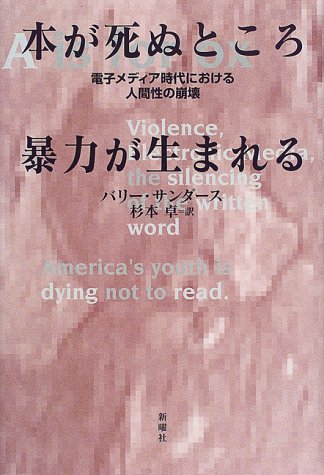
"A is for ox: Vuolence, electronic media, and the silencing of the written word" 1994 by Barry Sandersの訳です。
もう4半世紀前の本ですが、内容は刺激的です。まず邦訳のタイトルが衝撃的です。読者は、アメリカのスラム街を思い出すかもしれません。あるいはマスコミの格好のネタである日本の少年犯罪。私は、「華氏451」を読んだので、読み返してみました。
「識字(リテラシー、literacy)」を深く考える本です。「識字」というのは単に読み書きができるということではありません。識字はその前に口承文化をしっかり身につけていないと、ちゃんとした識字には到達できないと著者は言います。そして、その口承文化は母親とのふれあいの中で形作られる。だから、生まれてからある年齢までは、母親の存在が不可欠だし、それまでは文字を教えるべきではないと。そして、口承文化を身につけるためにはテレビやゲームなどの影響は排除すべきだと。なぜなら、テレビ番組やコンピュータゲームは、誰かが作ったプログラム、ルール(規則)に従うことを強制されるので、「自己」(これは識字に伴ってできる)を作る土台ができません。自己がなければ、罪の意識も生まれません。
今では、子供だけでなく、両親も、そして多くの祖父母もテレビ時代に育ちました。それがどういう社会(国)を作ったのかは、皆さんにも分かると思います。最近、窃盗やいたずら、道路交通法違反などがマスコミで流されていますが、マスコミはその原因を追求しようとはしません。ただ国民を脅すことに専念しているようです。それを無批判に受け入れる人々、彼らも同じなのです。
女性の社会進出が、奨励されて久しくなります。それは一つには女性解放運動の成果ですが、実態は、安い女性労働者の創出と、男性の賃金の減少を招いていることは明らかです。女性がやりたいことを出来る社会は目指すべきことです。しかし、それまで男性がやりたいことができていたわけでは決してありません。今はサラリーマンが労働者人口の多数を占めますが、彼らのうち、自分が本当にやりたいことを仕事にしている人がどのくらいいるでしょうか。ほとんどいないでしょう。やりたくないけどお金のために働いている(働くことが出来る)人は、労働している間は本当の「自己」はいないのです。自分を押し殺して会社のために働くことが出来るのは、今となってはテレビのおかげかも知れません。逆説的ですけど。
女性が男性と同じように働くことは今でも難しいです。特に出産子育てをすることは難しい。産休に給与を支払う会社は多いでしょうが、育休に給与を払う会社は少ないでしょう。それが雇用の均等を阻害する要因にもなるからです。それに対する施策を講じることなく少子化問題を大々的に掲げることの不条理を追求する人もいません。国会で論議されるのは、幼稚園・保育園不足の問題ばかりです。さもそれが女性のためとでも言うように。
テレビや電子メディアで育った人間は、自分で考えたり感じたりすることができません。子育てにもマニュアルを求めます。でも、子育てにマニュアルは不要であるばかりか、子育てに支障をきたします。母親は子育てに不安を持ちます。オムツもない口承文化の中で育った人は、子供がおしっこをしたいかどうか分かるといいます。彼女らはそれを論理的に説明することはできません。識字の世界に入った人は、自己を認識する代わりに、感じることを忘れてしまうのでしょう。そういうことのない「識字」の世界、それがこの本の著者が言う「識字」なのだと思います。
私は、画面で文字(特に本)を読むのが苦手です。光の反射で紙の本を読むのと、画面の直接の光で本を読むのとは脳の反応する場所が違うという話を聞いたことがあります。多分、映画やテレビを観たり、ゲームをする時反応する部分で本を読んでいるのではないでしょうか。ドラマを観る時と演劇を観る時との違いも同じかもしれません。ライブとDVDでも同じことが言えるかもしれません。今流行りのネット中継での共演と、実際同じ場所で行う共演も同じことかもしれません。画面から入ってくる情報は限界があります。生の情報とは比べ物になりません。「新しい生活様式」。人間関係がテレビと視聴者の関係になってしまうことは恐ろしいことです。だれもが発信者にも受け手にもなれるという面だけで捉えたSNSの問題点もそこにあると思います。結局、他人のことを考えられるような正常な自己はそこでは育たないし、正常な人間関係も構築できないのです。SNSだと好きなことが言えると思って人を傷つけるようなことを平気で書き込めるのは当たり前なのです。面と向かっていえないことが言える、それがSNSの本質です。匿名性が自己表出ではないことを考えられること。それも正しい「識字」を身に着けたかどうかに関わっています。
⟨impressions⟩
"A is for ox: Vuolence, electronic media, and the silencing of the written word" 1994 by Barry Sanders.
It's a quarter-century-old book, but the content is exciting. First of all, the title of the Japanese translation is shocking. Readers may recall America's slums. Or Japanese juvenile crimes, which are the material of the mass media. I read "Fahrenheit 451", so I read it back.
A book that deeply considers "literacy". "Literacy" does not simply mean reading and writing. The authors say that literacy can't be achieved without proper oral culture before that. And the oral culture is shaped in the interaction with the mother. Therefore, the existence of a mother is indispensable from birth to a certain age, and until that time, the character should not be taught. And in order to acquire oral culture, the influence of TV and games should be eliminated. Because TV shows and computer games are obliged to obey programs, rules created by someone, so there is no basis for making "self" (which can be done with literacy). Without one's self, no guilt will be born.
Now, not only children, but also parents, and many grandparents, grew up in the TV era. I think everyone can understand what kind of society (country) it created. Recently, theft, mischief, road traffic law violations, etc. have been reported in the media, but the media do not seek to find the cause. It seems that they are just focusing on threatening the people. People who accept it uncritically, they are the same.
It's been a long time since women's social advancement was encouraged. This is partly the result of the Women's Liberation Movement, but it is clear that the reality is that it leads to the creation of cheap female workers and the reduction of men's wages. A society where women can do what they want is something to aim for. But it was by no means what men could have done. Today, office workers make up the majority of the workforce, but how many of them do what they really want to do? Almost never. Those who don't want to do but work (can) work for money have no real "self" while working. It may be thanks to television that I can push myself to work for the company. It's paradoxical.
It's still difficult for women to work like men. It is especially difficult to give birth and raise children. Many companies will pay for maternity leave, but few will pay for maternity leave. That is also a factor that hinders equal employment. No one pursues the absurdity of raising the issue of declining birthrate on a large scale without taking measures against it. All that is discussed in the Diet is the problem of lack of kindergartens and preschools. Well, as it says for women.
People raised on TV and electronic media cannot think and feel for themselves. I also ask for a manual for raising children. However, not only is a manual unnecessary for parenting, but it also hinders parenting. Mothers are worried about raising children. Those who grew up in an oral culture without diapers will know if their child wants to pee. They can't explain it logically. People who enter the literacy world will forget what they feel, instead of recognizing themselves. The world of "literacy" that does not have such a thing, I think that is the "literacy" that the author of this book says.
I'm not good at reading characters (especially books) on the screen. I've heard that reading a paper book with the reflection of light differs from reading a book with the direct light of the screen in the place where the brain reacts. Perhaps you are reading a book in the part that reacts when you watch movies, TV, or play games. The difference between watching a drama and watching a drama may be the same. The same can be said for live and DVD. The same may be true of co-starring on the internet, which is now popular, and co-starring in the same place. The information coming from the screen is limited. It is incomparable to raw information. "New lifestyle". It's horrible that the relationship becomes a relationship between the television and the viewer. I think that there is a problem with SNS that only anyone can be a sender and a receiver. After all, a normal self who can think of others cannot grow up there, nor can he build normal relationships. It's natural to be able to write things that hurt people because you can say what you like on SNS. The essence of SNS is that you can say things that cannot be said in person. Being able to think that anonymity is not self-expression. It also has something to do with the correct "literacy".
"A is for ox: Vuolence, electronic media, and the silencing of the written word" 1994 by Barry Sanders.
It's a quarter-century-old book, but the content is exciting. First of all, the title of the Japanese translation is shocking. Readers may recall America's slums. Or Japanese juvenile crimes, which are the material of the mass media. I read "Fahrenheit 451", so I read it back.
A book that deeply considers "literacy". "Literacy" does not simply mean reading and writing. The authors say that literacy can't be achieved without proper oral culture before that. And the oral culture is shaped in the interaction with the mother. Therefore, the existence of a mother is indispensable from birth to a certain age, and until that time, the character should not be taught. And in order to acquire oral culture, the influence of TV and games should be eliminated. Because TV shows and computer games are obliged to obey programs, rules created by someone, so there is no basis for making "self" (which can be done with literacy). Without one's self, no guilt will be born.
Now, not only children, but also parents, and many grandparents, grew up in the TV era. I think everyone can understand what kind of society (country) it created. Recently, theft, mischief, road traffic law violations, etc. have been reported in the media, but the media do not seek to find the cause. It seems that they are just focusing on threatening the people. People who accept it uncritically, they are the same.
It's been a long time since women's social advancement was encouraged. This is partly the result of the Women's Liberation Movement, but it is clear that the reality is that it leads to the creation of cheap female workers and the reduction of men's wages. A society where women can do what they want is something to aim for. But it was by no means what men could have done. Today, office workers make up the majority of the workforce, but how many of them do what they really want to do? Almost never. Those who don't want to do but work (can) work for money have no real "self" while working. It may be thanks to television that I can push myself to work for the company. It's paradoxical.
It's still difficult for women to work like men. It is especially difficult to give birth and raise children. Many companies will pay for maternity leave, but few will pay for maternity leave. That is also a factor that hinders equal employment. No one pursues the absurdity of raising the issue of declining birthrate on a large scale without taking measures against it. All that is discussed in the Diet is the problem of lack of kindergartens and preschools. Well, as it says for women.
People raised on TV and electronic media cannot think and feel for themselves. I also ask for a manual for raising children. However, not only is a manual unnecessary for parenting, but it also hinders parenting. Mothers are worried about raising children. Those who grew up in an oral culture without diapers will know if their child wants to pee. They can't explain it logically. People who enter the literacy world will forget what they feel, instead of recognizing themselves. The world of "literacy" that does not have such a thing, I think that is the "literacy" that the author of this book says.
I'm not good at reading characters (especially books) on the screen. I've heard that reading a paper book with the reflection of light differs from reading a book with the direct light of the screen in the place where the brain reacts. Perhaps you are reading a book in the part that reacts when you watch movies, TV, or play games. The difference between watching a drama and watching a drama may be the same. The same can be said for live and DVD. The same may be true of co-starring on the internet, which is now popular, and co-starring in the same place. The information coming from the screen is limited. It is incomparable to raw information. "New lifestyle". It's horrible that the relationship becomes a relationship between the television and the viewer. I think that there is a problem with SNS that only anyone can be a sender and a receiver. After all, a normal self who can think of others cannot grow up there, nor can he build normal relationships. It's natural to be able to write things that hurt people because you can say what you like on SNS. The essence of SNS is that you can say things that cannot be said in person. Being able to think that anonymity is not self-expression. It also has something to do with the correct "literacy".
本が死ぬところ暴力が生まれる 電子メディアが本にとって代わるとき何が起こるか?子どもの成長に読み書きの文化はどんな意味を持っているのか? メディアと人間性の発達との関係への深い洞察から生まれた書物復興への熱い提言
抜粋
私たちは識字について、根本的な再定義が必要である。識字を形成する際に口承の果たす役割の重要さの再認識がそこには含まれている。社会が識字のあらゆる外見を備えながら、その社会の支配的メタファーとしての本を捨ててしまうということが何を意味するのか、根本的に吟味する必要がある。自己を見るための最も主要なメタファーとして、コンピュータが本にとって変わるとき、何が起こるか理解しなければならない。自己が存する場所である内的空間の重要性を論じるのに、その内面を識字がどのようにして形成にてきたのかということに触れないわけにはいかない。(第4章「電子メディア時代と「人間」の変容より)
抜粋
私たちは識字について、根本的な再定義が必要である。識字を形成する際に口承の果たす役割の重要さの再認識がそこには含まれている。社会が識字のあらゆる外見を備えながら、その社会の支配的メタファーとしての本を捨ててしまうということが何を意味するのか、根本的に吟味する必要がある。自己を見るための最も主要なメタファーとして、コンピュータが本にとって変わるとき、何が起こるか理解しなければならない。自己が存する場所である内的空間の重要性を論じるのに、その内面を識字がどのようにして形成にてきたのかということに触れないわけにはいかない。(第4章「電子メディア時代と「人間」の変容より)
[ ISBN-13 : 978-4788506527 ]


